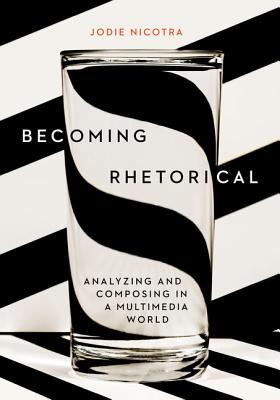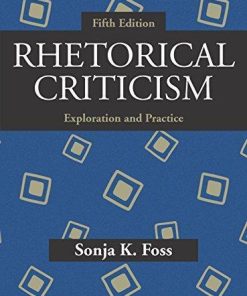Becoming Rhetorical: Analyzing and Composing in a Multimedia World Jodie Nicotra
$50.00 Original price was: $50.00.$25.00Current price is: $25.00.
Becoming Rhetorical: Analyzing and Composing in a Multimedia World – Ebook Instant Download/Delivery ISBN(s): 9781305956773,130595677X

Product details:
- ISBN-10 : 130595677X
- ISBN-13 : 978-1305956773
- Author(s): Jodie Nicotra
In your courses and career, you will compose essays, reports, photos, graphics, web pages, and more. BECOMING RHETORICAL gives you the tools and the training you need to create successful communications in all of these formats and in different situations. First you will learn tools of analysis — ways to investigate different aspects of a situation that will guide you to respond in the best possible way. Then you will learn how to draw on the specific capabilities of each medium of composition — words, still images, sounds, video — to create compositions that affect your audience in the ways you intend. As you learn to analyze and compose, you will read examples annotated by the author to show you exactly how it is done, and practice on projects large and small. Whether you have to design a brochure or make a video, BECOMING RHETORICAL gives you the foundations to make it work.
Table contents:
Part
1: WHAT “BECOMING RHETORICAL” MEANS. Introduction. What It Means to Become Rhetorical. What Is Rhetorical Training? MindTap Tiny Lecture Video
1: Rhetoric Is a Muscle. Why Rhetorical Analysis Is Important. Why Rhetorical Production Is Important. What It Really Means to Become Rhetorical: Transfer of Skills.
1. The Basic Rhetorical Situation. The Communicator(s): How Do They Convince Us of Their Relevance? Message: What Is the Communication About? Audience: Who Is the Communication For? MindTap How to Video
1: Analyzing Audiences. For Reflection: Transferable Skills and Concepts.
2. The Expanded Rhetorical Situation. Exigence: What Invites You to Communicate? MindTap Tiny Lecture Video
2: What Is Exigence? Purpose: What Does This Communication Want? Modality, The Means of Communication (Modality, Medium, Genre, Circulation): How Does Communication Physically Happen? MindTap Tiny Lecture Video
3: Thinking About the Means of Communication. Assignment: Compare Compositions That Have Similar Purposes but Different Formats. For Reflection: Transferable Skills and Concepts. Part
2: RHETORICAL ANALYSIS.
3. Analyzing Textual Rhetoric. Thinking Rhetorical About Reading Texts. Writing Summaries. Researching the Rhetorical Situation of a Text. Doing a Rhetorical Analysis of a Written Text. For Reflection: Transferable Skills and Concepts.
4. Analyzing Visual Rhetoric. Thinking Rhetorically about Stand-Alone Images. Thinking Rhetorically about the Placement, Circulation, and Distribution of Images. The Rhetorical Work of Images in Texts. For Reflection: Transferable Skills and Concepts.
5. Analyzing Multimodal Rhetoric. Thinking Rhetorically About How Modalities Interact. Applying Multimodal Analysis to Video. Applying Multimodal Analysis to Websites and Apps. For Reflection: Transferable Skills and Concepts. Part
3: RHETORICAL PRODUCTION.
6. The Invitation to Rhetoric: Defining Rhetorical Problems. Event-Based Problems. Everyday Problems. Tasks for Defining a Rhetorical Problem. Articulating Rhetorical Problems through Writing: The Rhetorical Problem Statement. Addressing a Rhetorical Problem: Public Awareness Campaigns. For Reflection: Transferable Skills and Concepts.
7. Responding to Rhetorical Problems with Arguments. Arguments as Inquiry, Not Fights. Inhabiting an Idea: Arguments as Response. Written Arguments. Visual Arguments. Multimodal Arguments. For Reflection: Transferable Skills and Concepts.
8. Explaining Concepts, Events, and Ideas. The Booming Business of Explanations. Explaining as a Rhetorical Activity. The Elements of Explanations. Assignments: Composing Explanations. For Reflection: Transferable Skills and Concepts.
9. Defining. Definitions within Communities. Making Arguments of Definition. Formulating Definition Arguments. Assignments: Composing Definitions. For Reflection: Transferable Skills and Concepts.
10. Evaluating. Everyday Evaluations. Establishing and Ranking Criteria: The Heart of an Evaluation. Using Evidence in Evaluation Arguments to Draw Conclusions. Evaluating Consumer Products. Composing Multimodal Consumer Reviews. Evaluating a Person’s Accomplishments. Evaluating Policies. For Reflection: Transferable Skills and Concepts.
11. Proposing. The Gold Standard of Persuasion: Action. Components of Proposal Arguments. Persuasively Describing a Problem or Need. Making a Compelling Proposal Claim. Providing Support for Your Proposal. Acknowledging Potential Problems with Your Proposal. Showing That Your Proposal Will Fix the Problem. For Reflection: Transferable Skills and Concepts. Part
4: TOOLS FOR COMPOSING.
12. Research: Composing with Multiple Sources. The Recursive Steps of the Research Process. Incorporating Sources into Your Compositions. For Reflection: Transferable Skills and Concepts.
13. Creating Written Compositions. Embracing the Messiness of the Writing Process. Writing in Academic Genres. Writing for Civic Participation.
14. Creating Visual Compositions. When to Use Visual Compositions for Rhetorical Purposes. Good Visual Design: Basic Building Blocks. How-Tos: Tutorials for Specific Visual Compositions. For Reflection: Transferable Skills and Concepts.
15. Creating Multimodal Compositions. How to Create Videos. How to Create Podcasts. How to Create Websites. For Reflection: Transferable Skills and Concepts.
People also search:
becoming rhetorical pdf free
becoming rhetorical jodie nicotra pdf
becoming rhetorical 2nd edition
what does becoming rhetorical mean
becoming rhetorical pdf reddit
becoming rhetorical book
You may also like…
Business & Economics - Management & Leadership
Jurisprudence & Law - Criminology: Court. Examination
Medicine
Uncategorized
Education Studies & Teaching - Teaching & Teacher Training












